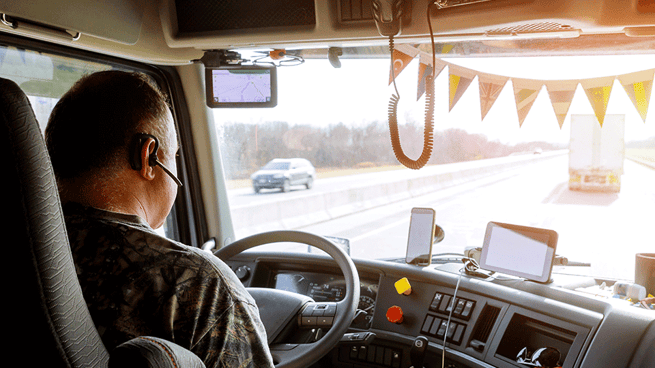Moving your freight from A to B can be done in several ways. Sometimes, this process incorporates multiple modes of transport. In this article, we’ll cover instances where both trucks and aircraft are used to complete your freight’s journey.
Though it’s not uncommon for shippers to use over-the-road and air transportation solutions to move their freight — the frequency of which is increasing as technology progresses — lining these shipments up will take a robust understanding of the rules governing them.
In most cases, getting cargo cleared to enter an airport will require your driver to hold a Transportation Security Administration (TSA) certification.
But what is a TSA certification really? How do drivers earn them and why are they so important?
Perhaps most importantly, what steps do you need to take to line up a TSA-certified solution for your next shipment?
In this article, we’ll answer these questions so you’re as prepared as possible to successfully move your shipment via land and sky.
Below, you’ll find information organized as follows:
- What is a TSA-certified truck driver?
- How do truck drivers earn a TSA certification?
- Why are TSA certifications important?
- How can you find a TSA-certified trucking solution?
Your deadlines might be missed if your truck driver can’t gain admittance to the airstrip/port where your cargo plane waits. Avoid disruption going forward by understanding and accounting for the information below.
What is a TSA-Certified Truck Driver?
A TSA-certified truck driver works for a company with the legal certification and permissions needed to enter a TSA-controlled airport or facility. TSA certifications allow drivers to enter TSA areas and transfer all approved freight from the bed of their semi-truck to an aircraft.
Note: TSA-certified drivers typically aren’t needed for picking up freight at an airport as cargo has already been cleared.
Related: Comparing TWIC & TSA Certification: What's the Difference?
How Do Truck Drivers Earn a TSA Certification?
TSA certifications are earned annually by participating trucking companies that have taken the steps to become certified Indirect Air Carriers (IACs). IAC status is earned by submitting an application through the TSA's Indirect Air Carrier Management System and then working with a TSA Principle Security Inspector.
Another large piece of this is the Security Threat Assessment (STA).
Federal regulations now require that anyone who has “unescorted access to cargo” that will be shipped by air must have a STA. Employees and contractors working for a Certified Cargo Screening Facility must complete an STA and be trained on the proper handling of cargo and sensitive security information.
The STA is done by the TSA and is designed to make sure those carrying air cargo do not and are not suspected of:
- Posing a threat to national security
- Posing a threat to transportation security
- Posing a threat of terrorism
The STA application can be found here. Once an application is submitted, the TSA will confirm the submitter's identity and search government databases to determine if they meet threat assessment standards. Every truck driver that's employed by a certified IAC and plans to haul cargo onto grounds monitored by the TSA will have to submit an STA.
Similar to hazmat or tanker-endorsed drivers, TSA-certified carriers are given a special place in the transportation marketplace; they're capable of interacting with airlines and cargo planes.
Why Are TSA Certifications Important?
TSA certifications help regulate the freight transported via aircraft. Air travel is an intricate process, with many items restricted from moving via air. As such, the more control the TSA administers, the safer every stakeholder is. These certifications are especially important when passenger airplanes are utilized to haul cargo as they help to facilitate a safe, secure and expeditious process for all.

How Can You Find a TSA-Certified Trucking Solution?
Most trucking companies are no strangers to the TSA’s cargo programs. That said, some carriers hold TSA certifications while others don’t.
To ensure the driver on your load has the necessary certifications, make sure to work with a competent transportation provider. If this is a freight broker, verify that they have taken the necessary steps to become a registered IAC and have systems in place to ensure compliance with the TSA’s rules and regulations.
If your work directly with a trucking company, ask about their experience working with your air carrier (arranged separately) how long they've been certified IACs.
The last thing you want to do is find out, at the last minute, that your driver isn’t legally allowed to move your cargo.
Here’s Another Important Carrier Certification to Look For
Although they help to keep national and international airways safe, TSA certifications aren’t the only things you should look for when selecting your next carrier. Sure, a TSA-certified driver might be required to haul your load but truly safe carriers go beyond these certifications.
Another great certification to search for in your next trucking company is the Customs-Trade Partnership Against Terrorism (CTPAT) certification.
As a program dedicated to improving the supply chain of, and all those adjacent to, the companies (carriers, manufacturers, importers, etc.) that hold it, the CTPAT certification displays a trucking company’s commitment to safety — above and beyond what’s required of them.
Check out this article on CTPAT certifications for more information on why they’re so important and how working with a CTPAT carrier can make a positive impact on your business going forward.

